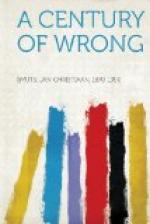Mr. Rhodes, with that treacherous duplicity which is an enduring characteristic of British policy in South Africa, co-operated publicly, and in the closest relationship, with the Colonial Africanders, while he was secretly fomenting a conspiracy with Jingoism against the Cape Africanders and the South African Republics. He already had the Africanders in the Cape Colony under his sway; his aim was now to gain the same influence in the South African Republic, with its rich gold mines—not so much, perhaps, for himself personally as for Capitalism, with which his interests were so closely identified. In case of success, he would obtain his personal aim, and Capitalism would be absolutely despotic in South Africa. With an eye to this end he, with other Capitalists, began in 1892 to foment a political agitation in Johannesburg against the Republic. In a place like Johannesburg, where drink is consumed in great quantities, and where the high altitude and the stress of business all tend to keep people’s spirits in a constant state of excitability, it was easy enough, with the aid of money, to bring about a state of political ferment in a very short time, especially as just that measure of grievances existed to give a colour of truth to the imaginary ones.
[Sidenote: The National Union.]
Under these conditions the National Union movement originated in 1892. Its adherents were entirely composed of the creatures and parasites of the Capitalists, with a few honest fools and enthusiasts who naturally did not think deeply enough to discern the aim and the trend of this hypocritical movement.
The Capitalists at this time certainly kept well in the background, in order that the movement might have the appearance of being a popular one. The Capitalists of Johannesburg were, however, a theatrical lot, and the desire to play a prominent role was too intense to be suppressed for any length of time, so that after the lapse of a couple of years they naturally took the leading part in the opera bouffe agitation which followed.
[Sidenote: Corruption of the Capitalists.]
They began, by means of the lowest and most repulsive methods, to undermine the Boer policy in order to gain the mastery of the mining legislation and administration. They had persuaded themselves and the rest of the world that the Boers were as a body corrupt and tainted, so they armed themselves, with the power of money in order to overthrow them.
Lionel Phillips wrote in this spirit on the 16th June, 1894, to Beit in London:—[30] “I may here say that, as you of course know, I have no desire for political rights, and believe as a whole that the community is not ambitious in this respect. The bewaarplaatsen question will, I think, be settled in our favour, but at a cost of about L25,000. It is proposed to spend a good deal of money in order to secure a better Raad, but it must be remembered that the spending of money on elections has, by recent legislation, been made a criminal offence, and the matter will have to be carefully handled.”




